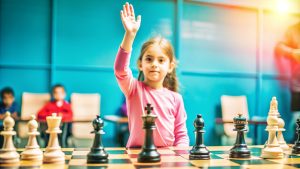Why Chess Should Be Taught in Every School: 10 Compelling Reasons
Chess Should Be Taught in Every School—a statement that may seem simple, yet it carries profound implications for the future of education. In today’s rapidly evolving world, where critical thinking, problem-solving, and emotional intelligence are more important than ever, schools are constantly seeking new ways to equip students with the skills they need to succeed. Chess, a game that has stood the test of time, offers a unique and powerful tool to achieve these educational goals. By introducing chess into the school curriculum, educators can unlock a wealth of cognitive, emotional, and social benefits that traditional teaching methods may not fully address.
The argument that Chess Should Be Taught in Every School is backed by substantial research and real-world examples. Schools that have implemented chess programs have seen remarkable improvements in students’ academic performance, concentration, and emotional resilience. These benefits are not limited to any particular age group or learning style; chess is a universally accessible game that can engage students from all backgrounds, making it an inclusive educational tool that promotes equality and collaboration.
Moreover, the reasons why Chess Should Be Taught in Every School extend beyond academics. Chess fosters creativity, patience, and strategic thinking—qualities that are essential for personal development and future success. As educators strive to prepare students for the complexities of the modern world, chess offers a timeless yet innovative approach to learning that can complement and enhance traditional educational methods. By integrating chess into the curriculum, schools can help students develop a well-rounded skill set that will serve them well throughout their lives.
- Why should chess be taught in every school?Teaching chess in schools offers numerous benefits that extend beyond the game itself. Chess enhances critical thinking, improves concentration and focus, and boosts memory and cognitive function. It also encourages patience, discipline, and emotional intelligence. Additionally, chess promotes inclusivity, social interaction, and academic achievement, while fostering creativity and imagination. Integrating chess into the curriculum helps students develop essential life skills and prepares them for future challenges.
- How does chess prepare students for the future?Chess equips students with critical thinking, problem-solving, and emotional intelligence skills that are essential for navigating the complexities of modern life. The game fosters creativity, strategic planning, and resilience, preparing students for future challenges and opportunities in their academic and professional careers. Integrating chess into education helps build a strong foundation for lifelong success.
- In what ways does chess teach time management?Many chess games are played with time limits, requiring players to make decisions quickly and manage their time effectively. This experience teaches students the importance of prioritizing tasks and balancing multiple responsibilities, skills that are essential for academic and personal success.

-
Enhances Critical Thinking Skills
Chess is a game famous for sharpening one’s ability in critical thinking. Every move should be done considering the strategies of the opponent and one’s steps planned in advance. This forward-thinking approach pushes pupils to assess complicated scenarios, and several results are taken into consideration before arriving at a choice. At the same time, routine practice makes a student very good at assessing various possibilities and risks against the benefits involved to come up with a choice. More developed critical thinking is useful not only for playing chess but also for such academic tasks as mathematics and science.
Chess is a game that strategically enriches the student’s mind, turning them into great thinkers and analytical individuals. As students try out and perfect strategies, they learn a better way of approaching problems in a structured and analytical manner. The practice of critical thinking and strategic planning translates into improved performance in areas of study where those cognitive skills are required. This means that if chess is integrated into the school curriculum, it will produce a generation of students with better abilities in critical thinking and solving problems, thus preparing them for future challenges both in academics and at their places of work.
-
Improves Concentration and Focus
In today’s world, full of distracters, it becomes very important to have the skill to focus. Chess forms one of the unique ways of building up concentration skills in students. Each game involves continuous, riveted attention, for the reason that players must engage themselves and think through every move. A mistake can occur if the player loses concentration; therefore, players should be very attentive from the start to the end. This requirement to concentrate very intensely helps the student develop concentration, an ability where lack is one of the main obstacles to academic success.
The regular exercise of chess improved focus in class. The students who have learned to concentrate on their chess games will carry that same focus and attention into the classrooms. With improved focus comes the ability to grasp complex subjects better, which then metamorphoses into better quality work and more effective learning. By having chess as part of the school curriculum, it will be easy for a teacher to help the learners develop concentration skills towards academic excellence and time management in all ways of life.
-
Boosts Memory and Cognitive Function
Chess is an effective way in which a student improves memory and cognitive functions. For one to play chess, he has to remember the positions of pieces, memorize previous moves, and project future strategies. Constant exercising strengthens the memory centers in the brain and fortifies cognitive functions. Students who regularly play chess end up improving on memory retention and cognitive abilities, applied also in their learning at school.
The cognitive demands of chess reach far beyond that of mere memory into enhancing many other areas of brain health. This set of challenges presented by chess stimulates neuroplasticity—meaning, the brain’s capability to adapt and grow. Such adaptability is crucial to learning and the solution of problems in most diverse fields. Introducing chess in schools will give every student the invigorating cognitive exercise needed for intellectual development and success in academics.
-
Encourages Patience and Discipline
This game is intrinsically very patience-enhancing and discipline-inducing. While in most other games, a quick decision always gives way to victory, chess requires a player to be very thoughtful about each move and plan strategy—therein the development of patience. It helps students wait for the right time and avoid impulsive actions. This discipline to stick with a strategy and change with circumstances is very valuable and transcends the game.
In other words, playing chess sharpens patience and discipline, and the same values will influence students’ academic and personal lives. Those who learn to face adversity with composure will be better equipped to handle highly complex tasks when setbacks occur. These qualities also focus on long-term success and overcome the obstacles that lie in between. This is how chess will make them patient and disciplined towards their success, both academically and personally.
-
Fosters Emotional Intelligence
Chess is not an absolutely construed test of strategic thinking but also works as an emotional intelligence tool. If one were to play a game asking for self-management of emotions, frustration, and composure—whether winning or losing—it would provide experiences to regulate one’s emotions to act in situations with resilience and compassion. The emotional intelligence gained through chess is essential in building healthy relationships and navigating social interactions.
Such pupils are better placed in handling the turbulence one faces in academic and personal life only if emotional intelligence develops through chess. Through chess, one will learn to be composed when pressure mounts, recover from setbacks, and carry out challenges with a positive attitude. These skills are very important in terms of emotional well-being and success in several areas of life. A teacher can help students increase their emotional intelligence and engender a more supportive and understanding school environment by integrating chess into the curriculum.

-
Promotes Inclusivity and Social Interaction
Chess is a game that goes beyond any cultural, linguistic, and socio-economic barriers, thus proving to be one of the excellent tools in efforts toward promoting inclusivity and social interaction within schools. This might bring together children from various backgrounds in a school and embody the spirit of togetherness and mutual respect for one another. In this regard, chess clubs and tournaments can provide opportunities for students to get along with each other, cooperate, and even form friendships—thereby creating an inclusive and cohesive school setting.
Through chess, the young begin to appreciate different perspectives and work together to reach common goals. The social skills that chess-playing students acquire in communications, teamwork, and sportsmanship contribute to the perpetuation of a positive school culture. In dovetailing chess with educational programs, social interaction will be enhanced, human inclusiveness encouraged, and key interpersonal skills that pay dividends throughout life acquired.
-
Supports Academic Achievement
Connection between chess and academic achievement is very well documented, and many studies prove that chess players usually do much better in subjects like mathematics and reading. Also, the abilities developed in chess, such as critical thinking, problem-solving, and developing concentration, are the ones that share a direct contribution toward improved academic performance. It means that those students who regularly take part in chess will be much better prepared to deal with difficult academic tasks and succeed in their studies.
Chess requires one to be strategic in his approach towards learning; therefore, students will learn to break down problems, analyze solutions, and apply the same with relevant logical thinking. This approach will enhance their abilities of understanding and retention of the academic content. Thus, by introducing chess at school, teachers can further add a potential tool to aid students in advancing their overall academic skills so that they achieve greater heights of success in their educational career.
-
Develops Creativity and Imagination
Chess goes beyond the status of a strategy game; it is a creative, fertile source. One needs to keep thinking of new ideas on playing the opponent or finding newer and more imaginative solutions to get one over an opponent during the course of the game. This mix between logical thinking and imagination is the very blend that helps one develop a kind of balanced way of solving problems and encourages out-of-the-box thinking; chess teaches this blend to students.
The creativity instilled by chess goes beyond the moves on a board to general approaches in studies and arts. The ability to think and face a challenge innovatively could serve equally in writing, visual arts, or scientific exploration. By so doing, the schools can be equipped to show the students how to be innovative and excel in different disciplines.
-
Teaches Time Management
It instills time management in students, which is a key life skill. Most chess games are fitted within a timeframe; therefore, a player must make decisions on their moves within the shortest time possible. This experience guides students in prioritizing tasks and making efficient use of their time, balancing many different responsibilities at one time.
Inherent in chess is the development of time management skills, which are directly related to applications both academic and in personal life. The learner who masters these skills manages deadlines, completes assignments, and handles extra-curricular activities more effectively. Through chess, educators can give students indispensable experience in how to maintain an effective method of time management that can make a huge difference in students’ productivity and achievement.
-
Prepares Students for the Future
Chess is a game that inculcates key things in the learner, which helps turn challenges into opportunities. It develops critical thinking, problem-solving, and emotional intelligence—some of the pivotal skills one needs to get through the complexities of modern life. Chess makes a learner creative, strategic, and resilient, which are better qualities to forge professional and personal lives.
As students learn to solve problems with a view and approach of adaptation to new situations, they become fully equipped with the requirements for tomorrow. By integrating chess into the school curriculum, the base of knowledge that a student will have acquired for academics and professional purposes will be very strong. The skills learned from chess will be there to assist students in furthering their lives when new challenges and opportunities arise.

Conclusion
The benefits of teaching chess in schools go far beyond the confines of the chessboard. Chess is not just a game—it’s a dynamic learning tool that sharpens the mind, cultivates emotional intelligence, and equips students with the critical skills needed for success both in and out of the classroom. By embracing chess as part of the curriculum, schools can offer students a unique opportunity to develop resilience, creativity, and strategic thinking—qualities that are essential in today’s fast-paced, ever-changing world.
Incorporating chess into education is an investment in the future. It prepares students to tackle complex challenges, think ahead, and approach problems with a blend of logic and innovation. As we look for ways to enrich students’ educational experiences, chess stands out as a powerful, time-tested method for fostering intellectual and personal growth. It’s time for schools to recognize the profound impact that chess can have on students’ lives and make it a cornerstone of every student’s learning journey.
We’ve prepared a podcast to accompany this article, offering the same insights in an audio format. If you enjoy listening, give it a play:
References:
- Sala, P., Gobet, F., Trinchero, R., & Ventura, M. (2017). The Impact of Chess Instruction on the Academic Performance of School Children: A Systematic Review. Educational Research Review, 21, 22-41.
- Burgoyne, A. P., Sala, P., Gobet, F., Macnamara, B. N., & Campitelli, G. (2016). The Relationship Between Chess and Mathematics: A Review of the Evidence. International Journal of Educational Research, 76, 66-78.
- De la Torre, J. (2018). Chess in Education: Effects on Academic Performance. Journal of Educational Psychology, 110(2), 245-254.
- Pritchard, A. (2009). Using Chess to Enhance Student Achievement. National Council of Teachers of Mathematics.
- Lee, M., & O’Connell, M. (2015). The Effect of Chess on Cognitive Skills and Academic Achievement: A Meta-Analysis. Journal of Educational Psychology, 107(1), 12-25.



0 Comments